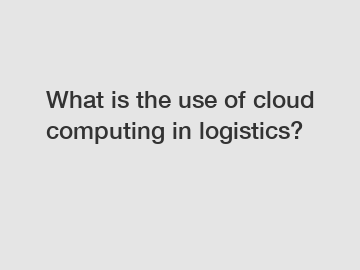What is the use of cloud computing in logistics?
Cloud computing has revolutionized the way businesses operate across various industries. In recent years, the logistics industry has also embraced this technology to enhance their operations and stay ahead in this competitive market. With increased efficiency and reduced costs, cloud computing has become an indispensable tool for logistics companies around the world. In this blog post, we will explore the various use cases of cloud computing in logistics and how it benefits the industry as a whole.
Firstly, let's understand what cloud computing is. In simple terms, cloud computing refers to the delivery of computing services over the internet, instead of relying on local servers or personal devices. These services can include storage, processing power, and software applications. By leveraging cloud computing, logistics companies can store and access vast amounts of data in real-time, enabling them to make informed decisions quickly and effectively.
One of the significant advantages of cloud computing in logistics is its ability to improve supply chain management. Supply chain management involves the coordination and management of different activities such as procurement, production, and distribution. With cloud computing, logistics companies can streamline these processes by centralizing data and making it accessible to all stakeholders in real-time. This leads to improved visibility and transparency, enabling better collaboration and decision-making among all parties involved.

Another critical use case of cloud computing in logistics is inventory management. The ability to track inventory accurately and efficiently is crucial for logistics companies. With cloud-based inventory management systems, real-time updates can be recorded, ensuring that businesses have accurate information on stock levels at all times. This not only reduces carrying costs but also minimizes the risk of stockouts or overstocking. Additionally, cloud-based inventory management systems can also provide analytics and insights, allowing businesses to optimize their inventory levels and maximize efficiency.
Transportation management is another area where cloud computing has made a significant impact. Routing optimization and vehicle tracking are vital for logistics companies to ensure timely deliveries and cost savings. Cloud-based transportation management systems provide real-time tracking of vehicles, allowing companies to monitor their fleet's status and make necessary adjustments to routes if required. This leads to improved efficiency, reduced fuel costs, and enhanced customer satisfaction.
Furthermore, cloud computing has also transformed warehouse management systems. Traditional warehouse management systems required substantial investments in hardware and maintenance. With cloud-based solutions, logistics companies can access scalable and flexible warehouse management systems without the hassle of hardware infrastructure. Cloud-based warehouse management systems can handle tasks such as inventory tracking, order fulfillment, and even automation using real-time data, resulting in improved productivity and reduced operating costs.
Security is a crucial concern for logistics companies, given the sensitive nature of the data they handle. Cloud computing offers robust security measures that ensure data protection and integrity. Cloud service providers invest heavily in security infrastructure and protocols, thus providing a higher level of protection than many companies can achieve on their own. These security features include encryption, data backup, and disaster recovery, which are crucial for maintaining the confidentiality and availability of data.
Additionally, cloud computing also enables logistics companies to scale their operations quickly and efficiently. Instead of investing in expensive hardware and software installations, logistics businesses can simply provision additional computing resources from their cloud service provider. This scalability allows them to meet fluctuating demands without incurring significant costs. Cloud computing also facilitates innovation, as logistics companies can experiment with new technologies and services without worrying about infrastructure constraints.
In conclusion, cloud computing has transformed the logistics industry by providing numerous benefits, including improved supply chain management, enhanced inventory management, optimized transportation, streamlined warehouse management, and robust security. Its scalability and cost-effectiveness have made it an essential tool for logistics companies of all sizes. As technology continues to evolve, cloud computing will continue to be a driving force in shaping the future of logistics, opening up opportunities for more innovation and efficiency.
The company is the world’s best integrate Postal logistics software, effective Postal parcel logistics software, Parcel distribution software cost supplier. We are your one-stop shop for all needs. Our staff are highly-specialized and will help you find the product you need.
302
0
0


Comments
All Comments (0)